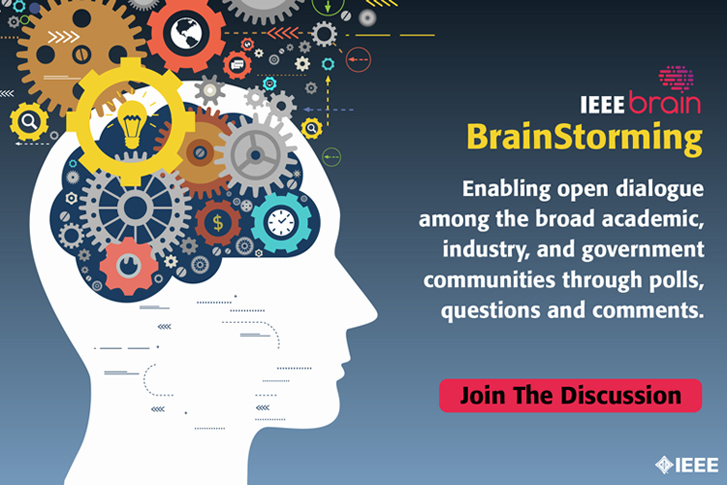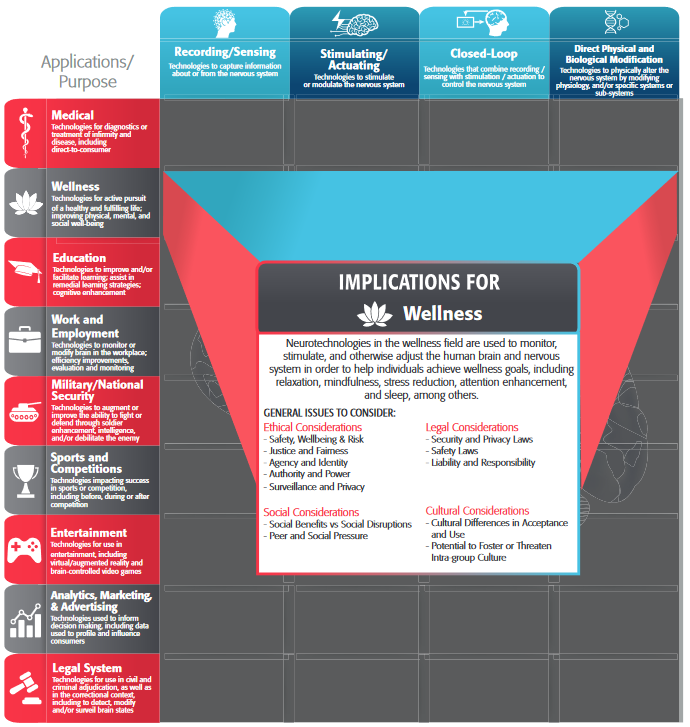About IEEE Brain Brainstorming
Understanding research and development paths to efficiently and effectively get to future technological visions is far from apparent. Open dialogue among the broad academic, industry, and government communities is a critical component of identifying the necessary research and development required to achieve a transformational level of technology. To enable the transition from science to field, dialogues must bridge multiple disciplines of science and engineering, as well as, non-traditional approaches that engender innovation. IEEE Brain Brainstorming offers the opportunity for the community to engage in an open dialogue on the science and engineering underlying specific technological goals.
Current Papers
Designing for the Brain–Body Axis as an Integrated System: Continuing the Conversation from NeuroCAS 2018
Call for Comments
This article poses a number of questions regarding current challenges and opportunities in neurotechnology with the intent of soliciting feedback. Your input is valuable, and will be used to help shape efforts such as identifying conference topics, white paper focus areas, and technology roadmap content. As you read, please take a few moments to respond to the questions found throughout the article.
Previous Papers
Individualizing Technologies for Effective Heterogeneous, Human-Agent Teams
Trends towards increasingly effective intelligent technologies (NSTC, 2016), novel approaches to integrate humans and intelligent technologies (NSTC, 2016), and increased resolution to understand and predict human behavior underlie projections of a future where human and intelligent agents join together to enable team functionality far surpassing today’s capabilities (see Mait et al, 2017).
Here, we brainstorm on one specific technological thrust area that potentially will enable these projections of the future: Individualizing technologies for effective heterogeneous, human-agent teams. That is, we target the goal of technologies that are tailored to individual team members or sub-groups to enhance the overall outcomes of a human-agent team. We open the discussion with a position paper that posits a future concept and contextualizes the technology goal. We welcome substantial concepts and dialogue on the scientific, engineering, and innovation challenges related to the proposed technology goal.
National Science and Technology Council: Networking and Information Technology Subcommittee (2016). The National Artificial Intelligence Research and Development Strategic Plan.
J. Mait, D. Poree, J. Prater, P. Reynolds, D. Stepp, B.J. West, A. Kott, A. Swami, A.H. DeCostanza, P.J. Franaszczuk, K. McDowell, B. Piekarski, B.M. Sadler, R. Carter, & J. Zabinski (2017). 2015 Army Science Planning and Strategy Meeting Series: Outcomes and Conclusions. ARL-SR-0390. US Army Research Laboratory. Aberdeen Proving Ground, MD.
How to contribute to
IEEE Brain Brainstorming
Individualizing Technologies for Effective Heterogeneous, Human-Agent Teams
IEEE Brain with the topic authors have integrated several mechanisms to engage in this Brainstorming activity. To gather quick opinions from the community, polling questions are embedded within the position paper itself. To allow for more substantial dialogue, comment blocks are also embedded within specific sections of the position paper, as well as, in a comment section of this webpage. For full responses, we strongly encourage uploading Archived papers addressing any or all of the following three challenge areas:
- Scientific: Papers focused on the scientific challenges that must be overcome to enable the individualization of technologies for enhancement of teaming, scientific approaches to overcome those challenges, and/or scientific achievements critical to enabling this future concept. Be sure to articulate why the response is critical to enabling individualizable technologies for teams comprised of both humans and agents.
- Engineering: Papers focused on the engineering challenges that must be overcome to enable the individualization of technologies for enhancement of teaming, engineering approaches to overcome those challenges, and/or engineering achievements critical to enabling this future concept. Articulation of specific concepts for individualizing technologies to team members are strongly encouraged.
- Innovation: Papers that focus on non-traditional approaches to bridge gaps between science, engineering, and fielding; engender innovation; and/or increase the rate and effectiveness of technology development and/or adoption.
Future Brainstorming topics
To submit ideas for future IEEE Brain Brainstorming topics, please send an email with the topic idea and why it fits IEEE Brain Brainstorming to brainstorming@ieee.org.



